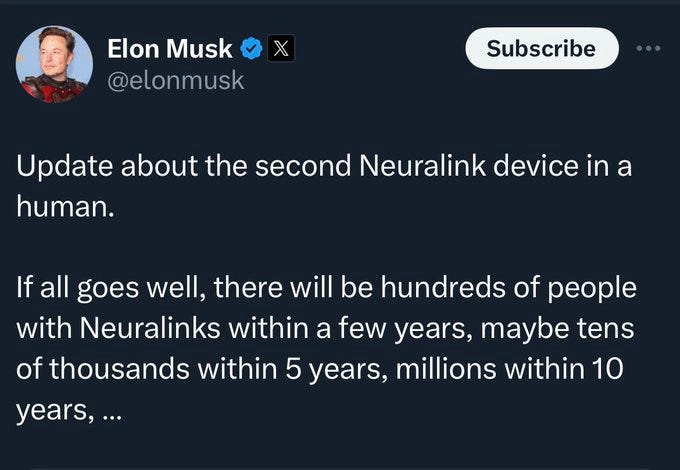

Discover more from DARK FUTURA
More and more society around us resembles a synthetic confection of passionless artifice. Everywhere you look, our reality is manipulated with all the modern tricks of the trade, straight off the innovation line. AI has yet to sport its first coat of paint, and it’s already being put through its paces in fashioning a Potemkin reality to keep the moldering real one from showing its liver spots.
Though I don’t usually bother with such normie podcasts, Peter Thiel made a good point in his recent appearance on the Joe Rogan show. He remarked that society’s progress has arguably been regressing since the 1970s, and that most technological advancement has been poured into a narrow ‘cone’ of digital tech exclusively, to the great neglect of everything else. He cited the Concord supersonic passenger jet as an example of a luxury people once had to cross the ocean at unparalleled speeds, which we now not only lack, but our travel dynamics have been made even worse with the advent of the TSA and the hyper-managerialized airline industry.
I have made this point myself for many years, after discovering an odd paradox about modern society. It occurred to me that, despite the lauded ‘advancements’ around us, the quality of our experience often gets worse. For instance, cell phones are extremely advanced computers in our hand, and yet their audio quality when speaking to someone is often far worse than old analog landlines. The phone is better at being everything other than a phone; calls often drop out, or there’s endless static, noise, and lagged delays that make communication difficult.
Thiel points out how technology distracts us from the crumbling infrastructure and regression around us: he cites people glued to their phones in the NYC subway, no doubt wowed by the digital rush mainlining into them—but oblivious to the tumbledown hundred-year-old subway train laboring them down the grotty tracks.
We’re witnessing a kind of unprecedented decoupling in modernity: as the real world goes to seed around us, the ruling class is forced to shore it up with a Potemkin-like confection to convince us that everything’s fine. But it only leads to a growing feeling of alterity, a kind of surreal disconnectedness, like being in a horrible dream.
Everything about our current global ruling regime pseudocracy is a phony construct, papering over the bitterly dismal state of things.
A Recent Axios Report Found: Vice President Kamala Harris' presidential campaign has been caught paying Google to show, as ads, fake news headlines favorable to her campaign. She's literally *paying* for the appearance of the headlines she wants, and Google is accommodating the request.
AI has simply added the final phantasmagoric touch to the mind-bending philter. Our elites have sprung to gleefully exploit their new ‘toy’ to its fullest. Any corner of society where the slightest advantage can be eked out in keeping the shroud over the public’s eyes, they’ll deploy their tool with alacrity. Both the grotesque circus of the recent Olympics, and the artificial theater of the DNC recently utilized similar techniques in simulating a concensus-manufacturing PR spectacle:
Synthworld extends far beyond just nascent AI utilization. In every other facet of experience, we’re now weltered in a vortex of synthetic deceptions such that reality itself is beginning to resemble an involuntary game show haze or scripted Matrix. Just this week Biden’s fraudulent job numbers were again revised down by nearly 1 million; every word out of the ruling regime’s mouth is now, as a rule, a craven travesty of gaslighting and lies, and the full totality of the digital leviathan is harnessed to fetch up their faltering reality-construct.
The same extends to corporations, which scramble to exploit the latest tech advancements to extract every last red cent from our hemorrhaging finances:
When they’re not doing that, they’re inundating us with a synthetic storm of advertisements and customer service “assistance”.
The first all AI-generated McDonalds ad:
Ironic, isn’t it, that AI was supposed to make things cheaper, yet the price of fast food like McDonalds itself has skyrocketed to restaurant levels:

As someone recently said: “AI was meant to do all the work while we stay home and create art. Instead, AI now creates all the art while we work more than ever for diminishing wages.”
Funny how that works.
We’re entering a time of war on reality itself.
The ruling elite have spent centuries fashioning an incalculably intricate web of occult control which is for the first time in history slowly becoming unwound. In order to preserve the status quo, they’re increasingly forced to transplant our realities like an artificial skin graft—and to make sure we don’t start asking questions, they surfeit us with AI-generated sensory datamosh overload.
It may seem humorous, but Elon Musk’s latest Neuralink trials have reportedly seen major successes, including the second official brain implant patient now being able to play the classic PC game Counter-Strike 2 with his brain.
Check the brain-jack—now not far off from the Matrix plugs we thought were so improbable back in the ‘90s.
Musk now optimistically predicts mass ubiquity of the brain interfaces within a decade or less:
Like it or not, this is the course we’ve compassed, and much of it can indeed be for a good cause. For instance, Musk’s team is working on a spinoff of Neuralink that will permanently cure blindness, giving sight to patients who’ve lost the ability to see in either one or both eyes.
He’s also stated Neuralink can soon be used to give amputees the ability to use limbs again by attaching a limb from the forthcoming Tesla Optimus robot and giving full control of it via Neuralink. The latest test demos have shown the new robot limbs have remarkably human-like articulation of joints, mini-joints like the fingers, etc., and would give an unprecedented ability for the disabled to have their old functional lives back.
Of course, it comes at a cost: permanently plugging your brain into the hardware of a billionaire oligarch and his vast, government-linked corporate empire.
This strikes at the heart of our upcoming crossroads and great human trial. Whether we like it or not, society will progressively digitize to the point where realities may become entirely subjective. Brain implants like the Neuralink will eventually—and possibly sooner than we think—be able to biohack us where any form of virtual or augmented reality can be superimposed directly into our visual cortex, which will eventually include the ability to control sensations, and essentially allow us to inhabit our dreams. Those who’ve longed for unrestricted ‘lucid dreaming’ will be thrilled to jack in and live out their wildest romps all in their minds, perhaps steadily devolving into a euphoric slop, like a heroin junkie vegetating in some light-starved corner of a moldy room.
Transfiguration
Advance that far enough, and we come to humanity’s last great burning question: If the simulation reaches a point of total convergence with reality, wherein it is no longer possible to distinguish the two, then does existing in such a state likewise become morally and spiritually tantamount to what was formerly known as physical, corporeal ‘life’?
Think about it this way: if God, who is said to have created everything, rewards us for our service to Him by apportioning us some slice of Heaven at his side, and if technology advances far enough where virtually no limit exists to the types of eternally euphoric states we can occupy in our jacked-in virtua-worlds, then does there come a point at which earthly religion, and by extension all our earthly ‘spiritual’ pursuits, simply obsolesces? If technology can advance to the point of total surrogacy of innate reality in every way, shape, and form, then would our previous religious experience or spiritual progression retain meaning any longer?
What can your God give you that the jacked-in synth experience dialed up to its fullest expression cannot? Immortality you say, as the after life is immortal, and this our telluric realm, lamentably, is not. But take the hypothetical to its full conclusion, which may very well be not too far off—even this century perhaps: technology at the level where we can “upload” our consciousness into the etheric cloud, thereby ‘transfiguring ourselves’ into an immortal, all-pervasive state. At what point does that become indistinguishable from the biblical promises which have steered humanity for eons? What possible “meaning” can religion have in such a state? Religion, that earthly narcotic and immemorial spiritual aphrodisiac, which has compassed our course from the very beginning, and has served as the collective refrain to our human lied—what further nourishment can it offer in the face of an indistinguishable, and perhaps even superior, facsimile?
You may split hairs and say that is not true immortality: even this distributed cloud ‘consciousness’ can be destroyed—whether by a fait accompli of foul play, or tragic accident. But everything is a matter of perspective: enough time elapses, and we can imagine a future where nanotech has refashioned our very cosmos into an ineradicable substrate of intelligence—a sort of universe-sized blockchain of consciousness, endlessly recursive, replicable, and persistent.
What then? What further argument could classical religion and spirituality have at that point?
The thought experiment allows us to speculate as to where in that long-stretching gray margin does it flip from one to another—at what point do our temporal preconceptions bleed through to a totally new metaphysical paradigm? Or more to the point: at which stage do we accept the newly conjured reality as our inevitable fate, one to be embraced rather than rejected as some apostatic abomination?
The ‘Godhead’—and universe itself—may be nothing more than the preprogrammed reality constructed as a technologic apex of some previous civilization. The religious among us innately fear technology as an unnatural evil, but as the previous question posed: at what point of total verisimilitude are you prepared to accept it?
The truth is, it’s not technology itself we have to fear: on its own, it is an inert science molded by potentially bad actors; it is those actors and their intentions we must be wary of. Technology will one day advance to the point of no longer being seen as ‘technological’ but rather an organic part of our natural environment, fusing with nature and reality itself—just like the argument for ‘intelligent design’ is in essence a technological argument at its core; we simply cloth the terms in more obscure ‘magical’ garbs when we don’t understand them.
The broader point is that it is not the tool, but who wields it. Presently, society has not evolved to a level of collective maturity necessary to produce individuals capable of ethically wielding such powerful tools with full immunity. If you look back in time, you’ll note people don’t really mind their elites, or their ‘betters’, so long as they believe them to represent their best interests, or be in cultural attunement to them. The main reason our modern world has gone off the rails is because our elites no longer represent us in any way—they don’t look like us, talk like us, come from the same cultural background as us; and this is by design.
The commoners often loved their Tsars, their Kings and Queens, even the lower scions and attendant retinues of royalty. They were of our blood, of our land, our heritage—or so in theory. Just look at the Brits’ enduring reverence for their royals to this day.
But our current tech-archons are internationalists, cosmopolitans, globalists—people who view our innate social fabrics as nothing more than scraps of tatty flea-market cloth to be sewn together into some patchwork horror.
Simplicius’ Basilisk
Peter Thiel made another trenchant point in his Rogan talk. He remarked how the existence of a faster than light drive in a given alien civilization would logically necessitate this civilization becoming one of two polar extremes: demons or angels. This is because faster than light technology allows the user to wield total strategic surprise against anyone, with no possibility for defense or survival against a weapon which can be launched anywhere and arrive instantaneously. Think of a hypothetical mega-nuke which is impossible to defend against because—traveling faster than light—it can arrive at the strategic center of a given civilization and instantly wipe it out with no recourse.
The rationale follows that a civilization which possesses faster than light tech must either be controlled by a totalitarian hivemind-like regime which precludes any possibility of a ‘rogue’ actor within their society utilizing such a weapon to wipe them out; or: this civilization must have attained some form of imponderably utopian high-trust society where cultural attunement is so unequivocal that no one would dare utilize this unstoppable tech to carry out a devastating terror attack against their own. Granted, this would take Democrat Party-levels of total conformity and loss of individuality, but I digress…
Now turn this frame onto our steadily growing synthworld. Suppose the elites manage to succeed in creating a type of utopian synthetic reality for themselves, as well as achieve immortality by way of either uploading their consciousness into the matrix, fusing it with AI in some way, or simply via utilizing the next generation of ASI—artificial super-intelligence—to invent cutting-edge biomedicines, tissue-rejuvenating nanobots, etc., which can biohack us to prolong human life indefinitely.
Anthropic CEO Dario Amodei says AI could increase the rate of discovery in biology by 100x, compressing the total amount of progress that occurred in the 20th and 21st centuries to just a few years
Accordingly, we can assume that AI tech would have likewise reached such a zenith where almost all human sustenance is indefinitely provided without much labor: not only does “uploading” one’s consciousness pretty much suppose we no longer have to consume food or calories to survive, but robots can also produce synthetic food in perpetuity.
Such a scenario begs the ultimate question: what would the elites actually need the rest of humanity, those ‘useless eaters’, for anymore?
If our tech elites manage to achieve this scenario, the same cast-iron logic would require that:
The elites must exterminate the remainder of humanity for the sake of continuity. Humans would no longer be necessary for the elites’ survival, to produce their food, for the rent-extraction surplus from their labor, etc. The elites would now have everything they need either from their digital synthworld via uploaded consciousness, or via labor bots that can produce whatever is necessary. Thus, any remaining humans not only leave nothing to offer, but rather present at least a quantifiable risk—as they can grow resentful and attempt to disrupt or destroy the elites’ newly-fashioned utopian synthworld, or kill some of the otherwise-immortal elites.
The only other alternative to extermination would be some form of total, irrevocable subjugation, such that no human could possibly escape from and pose any threat to the elite utopian continuum; more on that in a moment.
Thus, we barrel toward a point where humanity itself devolves into a liability to the fractional elite which are slowly building their eternal kingdom under the guise of some egalitarian vision. In reality, once they’ve achieved a certain technological threshold where the majority of humans are redundant, it becomes not only prudent, but necessary to eliminate them. There is a long tradition of related game-theoretic propositions, like the famed Thucydides Trap, or the Dark Forest Hypothesis.
Another closer one is the Katechon Hypothesis:
Abstract: A corollary of the Simulation Argument is that the universe’s computational capacity may be limited. Consequently, advanced alien civilizations may have incentives to avoid space colonization to avoid taking up too much “calculating space” and forcing a simulation shutdown. A possible solution to the Fermi Paradox is that analogous considerations may drive them to avoid broadcasting their presence to the cosmos, and to attempt to destroy or permanently cripple emerging civilizations on sight. This game-theoretical equilibrium could be interpreted as the “katechon” – that which withholds eschaton – doom, oblivion, the end of the world. The resulting state of mutually assured xenocide would result in a dark, seemingly empty universe intermittently populated by small, isolationist “hermit” civilizations.
Which is related to the Berserker Hypothesis, which states that alien civilizations may program quiescent robotic probes spread throughout the universe to ‘come alive’ when they detect sentient lifeforms and destroy those lifeforms on sight.
Berserker Hypothesis
Similar to the Dark Forest theory, this hypothesis suggests the existence of self-replicating machines programmed to destroy any emerging intelligent life. These "berserkers" could be:
Created by a long-extinct civilization
Designed to prevent the rise of potential competitors
Spread throughout the galaxy, lying dormant until detecting signs of intelligence
The same game-theoretic line of reasoning applies here: the elites would have no choice but to protect their realized immortal kingdom and heavenly utopia, at all costs—and the only way to ensure no threat can come to it is preemptive elimination of all latent threats, for all time.
What is the only possible alternative? Similar to Nick Bostrom’s Ancestor Simulation Theory, we can assume that rather than exterminate humanity, the elites could force humanity into a kind of controlled VR simulation which would give us the impression of free will, but would keep us bound in its nested reality forever without the ability to ‘unplug’ and threaten the elites’ self-created ‘base reality’. This is of course a close approximation of the plot to the original Matrix film.
Just as of this writing, 1X Tech has released a new ad for their upcoming personal servant bot, akin to Tesla’s Optimus:
The splash page of their site proudly displays their intentions:
This bot in particular is said to be made from some kind of more ‘natural’ material approximating human muscles, rather than rigid metallic structures. Paired with the upcoming AGI innovations, these robots could soon multiply throughout society, conducting virtually every labor previously the domain of humans. It would be only a matter of time before the ruling class has their eternal clone army of loyal servants with which to build and steward over their coming kingdom of ascension. After that, antique humans will be nothing more than inconvenient pests harboring in the floorboards of an impeccable mansion, requiring professional removal, lest they gnaw out the wiring or befoul the foundation.
The question will become: what trump card can humankind devise to preempt the elite techno-pharisees, and make them think twice before extirpating us when the time comes, and they’ve achieved their utopian self-sufficiency?
If you enjoyed the read, I would greatly appreciate if you subscribed to a monthly/yearly pledge to support my work, so that I may continue providing you with detailed, incisive reports like this one.
Alternatively, you can tip here: Tip Jar






















You're a compelling writer, I'll give you that. But reading this makes me feel like I'm watching a guy cackling in the corner of an opium den. He's having fun, but goddamn it's a pitiable state for an adult to get themselves into.
Honestly, I don't think I'll ever be understand just why people of Western European descent all think that they're all gods. Truly, it boggles my mind. Faster than light weapons? Please. And Neuralink? You do realize that China already has hundreds of people using something similar, and it doesn't even require brain surgery to work, right?
Also, about 90% of people who are blind have other serious issues like severe retardation or birth defects, so fixing their sight isn't really going to do much. Of course, anyone who's been to a center for the blind would know that, but why would Musk ever dirty his precious god brain by doing something like that?
Go play in your synth world, Westerners. Everyone else is doing just fine. I mean, have you seen the economy of Indonesia lately? Or India? Or the subway in Moscow? Have you seen the flying drones that can deliver a coffee to you at the park in China? Because all that and more already exists.
Honestly, from my point of view, all these Musks (whose own child hates his guts) and Thiels (childless homo) and everyone else (right down to Kamala Harris' entire fanbase) are just little rat kings fighting over a shrinking pile of shit. The real Americans moving the needle are people like Oliver Anthony, who just spent an entire year on tour without ever ONCE relying on corporate sponsorship, corporate ticket sales, or paid promotions on social media.
The America you think you see on your shiny screen is an illusion. The real folks are in the hills and the forests and growing food on the land, and unlike the synth shitstains, are having (unmutilated) babies and going to church and getting sunshine on their faces every day. Just be patient, good folks. This temporary aberration of e-morons will fade away soon enough, especially if they keep "boosting" themselves like their leaders tell them to :)
Meanwhile, let's just hope those superannuated Missileman nukes don't explode inside their own rusted out silos. You know the weapons I mean, the 100% not even close to being faster than light kind :)) Oh, and watch out for the F-35s falling out of the sky :P
Technology first appears as a novelty, next as a convenience which soon becomes a necessity, then eventually an obstacle.